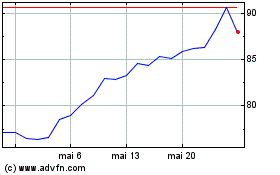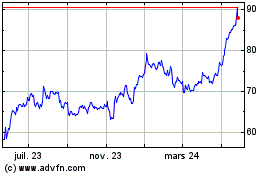Details Serious Concern with the Board’s
Decision to Effect a Debt-Financed Share Repurchase and Institute a
Poison Pill
Believes that the Board’s Recent Decisions
Expose Shareholders to Unnecessary Financial and Strategic
Risks
Contends the Board’s Decisions do not Benefit
All Shareholders
Danaos Corporation (“Danaos,” “we,” or “us”) (NYSE:DAC), one of
the world’s largest independent owners of containerships and the
largest shareholder of Eagle Bulk Shipping, Inc. (the “Company” or
“Eagle Bulk”) (NYSE:EGLE) with ownership of approximately 16.7% of
the outstanding shares, has issued a letter to the Board of
Directors of Eagle Bulk (the “Board”) in response to the Company’s
repurchase of Oaktree Capital’s (“Oaktree”) 28% stake in the
Company and unilateral adoption of a poison pill.
The full text of the letter issued to the Board follows:
A LETTER TO THE BOARD OF DIRECTORS OF
EAGLE BULK SHIPPING, INC. (EGLE)
June 26, 2023
Dear Members of the Board,
Danaos Corporation (“Danaos” or “we”) is the largest shareholder
of Eagle Bulk Shipping, Inc. (“Eagle Bulk”, “EGLE”, or the
“Company”), maintaining a 16.7% equity stake in the Company. As you
are likely aware, we are one of the largest independent owners of
modern, large-size containerships, chartering our fleet to many of
the world’s largest liner companies, and have been operating in the
maritime sector for over 50 years. Before making our initial
investment in the Company, we approached its management and
conveyed that our intention was to invest in the Company in the
open market and that a key consideration in our investment in the
Company was its sound track record in corporate governance. We
indicated our desire to work collaboratively and constructively
with the Board and believed that our intention was
reciprocated.
We were therefore surprised to see the announcement of the
Company’s recent repurchase of Oaktree Capital’s (“Oaktree”) entire
28% stake in the Company at nearly a 35% premium to the Company’s
45-day average share price and its decision to adopt a poison pill
without seeking prior shareholder approval. It goes without saying,
these transactions fundamentally alter the makeup of the Company.
As a result of the repurchase of Oaktree’s shares, there are
9,283,499 common shares outstanding and we now own 16.7% of the
Company’s shares, an increase from the approximately 11.3% we
purchased in open market transactions. Additionally, we are now
prohibited from purchasing any additional shares without triggering
the Company’s recently adopted poison pill. Since these actions
were taken by the Board, Eagle Bulk shares have declined by nearly
6%, which appears to provide a preliminary assessment of the
market’s reaction. We are concerned with these recent developments
and are seeking clarification to the following questions from the
Board:
1. How Does Repurchasing $219 million repurchase of Oaktree’s
stake protect all shareholders from disruption?
In the Company’s June 22, 2023 press release, Chairman Paul
Leand stated that the repurchase of Oaktree’s stake “ensures that
[Eagle Bulk] shareholders maintain the opportunity to realize the
value of their investment . . . and eliminates any potential
disruption resulting from the sale of [Oaktree’s 28% stake] in the
Company.” Implicit in the Company’s rationale for engaging in the
share purchase at the $58 per share price is the possibility that
Oaktree might indiscriminately sell its stake in Company in the
open market, negatively impacting the Company’s share price.
Accordingly, the Company is seemingly providing justification for
using all means at its discretion to repurchase Oaktree’s large
holdings, including increasing its debt burden and repurchasing
shares at a significant premium to the prevailing market price. It
is not clear, however, that a credible threat warranting such a
drastic response existed. In particular, if Oaktree truly wanted to
sell out of its position at the Company, it would have likely had
to do so at a materially lower price than the 45-day moving average
price of approximately $43.04. This would clearly not be in the
best interests of Oaktree.
Oaktree materially benefited by selling its significant stake at
a nearly 35% premium to Eagle’s 45-day average share price. We
struggle to understand how the Company’s decision to repurchase
Oaktree’s shares benefits all Eagle Bulk shareholders and question
whether the decisions taken by the Company were the most effective,
considered, or beneficial route for all shareholders. Rather, we
are concerned that the share repurchase and preferential treatment
afforded to Oaktree exposed Eagle Bulk’s remaining shareholders to
unnecessary strategic and financial risk. Indeed, the risk to
finance the repurchase with debt is shared by the Company’s
remaining shareholders.
2. How did the Board determine the fairness of the $58 per
share price offered to Oaktree and why weren’t other shareholders
afforded the same opportunity to tender their shares at that
price?
We struggle to understand why the Board engaged in this private
transaction when it could have pursued more egalitarian methods,
such as a tender offer directed towards all shareholders. Since the
start of 2017, the Company’s shares have traded above $58 for a
total of 90 days, or just 5.5% of total trading days. It seems
inherently unfair to us that the Company’s remaining shareholders
were not given the same opportunity to tender their shares at the
elevated price while simultaneously bearing the burdens of
financing the share repurchase.
While the Board justifies the significant premium paid to
Oaktree by stating that the purchase price represented a discount
to NAV, there seems to a significant difference between the fair
market value of the Company’s fleet, as calculated by two
third-party brokers as of June 12, 2023, and the GAAP value
ascribed to the fleet by the Company as of March 31, 2023. This is
particularly notable as the Company’s benchmark Baltic Supramax
Index has declined significantly since March 31, 2023 and quoted
vessel values have declined as well.
3. What is the true rationale for adopting the poison pill
and how does it protect Eagle Bulk shareholders?
The Company described the implementation of the poison pill as
reducing “…the likelihood that any person or group gains control of
the Company through open market accumulation, or other abusive
tactics potentially disadvantaging the interests of all
shareholders, without paying all shareholders an appropriate
control premium or providing the Company’s Board of Directors
sufficient time to make informed decisions in the best interest of
all shareholders.”
To our knowledge, we are the only shareholder that is now
effectively prohibited from purchasing any additional shares.
Again, our intention has only been to work collaboratively and
constructively with the Board and Eagle Bulk management. We
informed management of our intentions before purchasing our shares
in the open market. Perhaps the Board could elaborate on how an
open market purchase followed by a prompt 13G filing constitutes an
abusive tactic especially in light of the Board’s preferential deal
with Oaktree?
We struggle to see how the poison pill truly accomplishes the
Company’s stated goal of avoiding “abusive tactics” and are
concerned with where the share repurchase and poison pill leave us
as well as the Company’s other remaining shareholders. To this
point, we note that it is also peculiar that the Board is only now
adopting this poison pill (which is triggered at 15%) given the
fact that Oaktree was long permitted to maintain its significant
28% stake without a similarly threatening response from the Board.
Oaktree is a $164 billion enterprise with control positions in
multiple public shipping companies. They have the knowledge and
means to acquire the Company, but no poison pill was in place to
prevent them from doing so.
Finally, a less obvious but equally harmful consequence of the
poison pill is the limitation it places on the rights of the
remaining Eagle Bulk shareholders by limiting their ability to
communicate openly about their investments in the Company. For
example, the poison pill precludes us from having productive
discussions with other Eagle Bulk shareholders regarding the
significant value that could be unlocked over the fear that our
conversations with potentially like-minded Eagle Bulk shareholders
will trigger the poison pill’s dilution provisions. Given our
extensive knowledge of the shipping industry, we feel that we must
be able to communicate our views with the Company’s shareholders at
large to facilitate growth in shareholder value. The Board’s
defensive measure to adopt the poison pill without seeking the
prior approval of shareholders raises the question of whether the
Board is truly acting in the best interests of stockholders. We
can’t buy more stock, and the Company seeks to curtail our ability
to share our opinions absent a public forum.
Conclusion
As Eagle Bulk’s current largest shareholder, we have a strong
vested interest in seeing the Company enhance long-term shareholder
value and believe that we have a duty to speak up when we think the
Board and/or management may be acting outside the best interests of
all shareholders. Accordingly, we are committed to working
constructively with the Board to identify balanced,
well-considered, and effective methods to enhance shareholder value
on behalf of all shareholders. We look forward to constructive
engagement with the Board on moving the Company forward in a
positive direction.
Sincerely,
Danaos Corporation
About Danaos Corporation
Danaos Corporation is one of the largest independent owners of
modern, large-size containerships. Our current fleet of 68
containerships aggregating 421,293 TEU and 10 under construction
containerships aggregating 74,914 TEU ranks Danaos among the
largest containership charter owners in the world based on total
TEU capacity. Our fleet is chartered to many of the world's largest
liner companies on fixed-rate charters. Our long track record of
success is predicated on our efficient and rigorous operational
standards and environmental controls. Danaos Corporation's shares
trade on the New York Stock Exchange under the symbol "DAC".
Cautionary Statements
Statements contained in this press release that are not
historical facts are forward-looking statements within the meaning
of Section 27A of the Securities Act of 1933, as amended, and
Section 21E of the Securities Exchange Act of 1934, as amended.
Forward-looking statements include words or phrases such as
“anticipate,” “believe,” “estimate,” “expect,” “intend,” “plan,”
“project,” “could,” “may,” “might,” “should,” “will” and similar
words and specifically include statements relating to future
financial performance and shareholder value. Forward-looking
statements are aspirational and are not guarantees or promises that
such expectations, plans, or goals will be met. They are also
subject to numerous risks, uncertainties and assumptions that may
cause actual results to vary materially from those indicated. Each
forward-looking statement speaks only as of the date of the
particular statement and we undertake no obligation to update or
revise any forward-looking or other statements, except as required
by law and notwithstanding any historical practice of doing so.
View source
version on businesswire.com: https://www.businesswire.com/news/home/20230626926926/en/
Evangelos Chatzis Chief Financial Officer Danaos Corporation
Athens, Greece +30 210 419 6480 cfo@danaos.com
Iraklis Prokopakis Senior Vice President and Chief Operating
Officer Danaos Corporation Athens, Greece +30 210 419 6400
coo@danaos.com
Investor Relations and Financial Media Rose & Company
New York 212-359-2228 danaos@rosecoglobal.com
Danaos (NYSE:DAC)
Graphique Historique de l'Action
De Déc 2024 à Jan 2025

Danaos (NYSE:DAC)
Graphique Historique de l'Action
De Jan 2024 à Jan 2025
